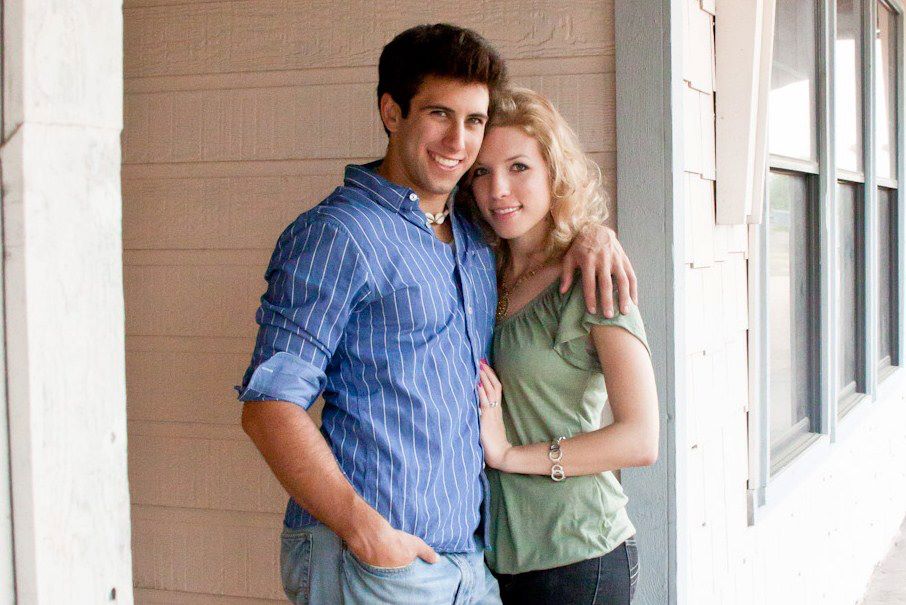What is given to only one man or woman in a thousand was given to [her],
a single-minded devotion to one human being of such power
that it was beyond the possibility of change until the end of time.
-Elizabeth Goudge-
Today should have been my eighth wedding anniversary. Instead, I’ve been a widow for over three and a half years. Often I feel the time passing. I think back to my years in Houston with Nathan and it truly feels like another lifetime; it could not be more different from the life I now live in Maryland with Elissa. Other times, I hear a song we loved together or catch a whiff of his cologne or realize that I’m fixing one of his favorite foods, and the pain cuts deep and fresh like a knife. I could swear it was just yesterday that he crawled into bed for the last time, holding me close as we stifled our laughter over newborn Elissa’s flatulence in the crib beside us.
As the years have passed, I’ve wondered what form my healing would take. Would I become guarded and cynical, or more open and loving? Would I recoil from close relationships in an effort to protect myself from inevitable future losses, or would I embrace friendships and community as priceless gifts? Would I succumb to the gaping hole in my heart, or would I allow God to put me back together as the whole and competent parent that my daughter desperately needed?
There were so many unknowns as I embarked on this journey, but one absolute rooted itself in my mind and never wavered. I never, ever again wanted to love anyone the way I had loved Nathan. Every love story is unique and one of a kind, but ours felt like something more – like two half souls meeting at their deepest core and forming a unity so intangible and profound that words could never express it. Mere months after meeting Nathan I swore to my journal that if I didn’t marry him, I wouldn’t get married at all. Losing him after just four years of marriage never once shook the conviction that he is my one, my only, my forever love.
Consequently, I placed fear of another relationship right up there with the fear of dying and leaving Elissa an orphan. I had a hard time entrusting that fear to God as other close widowed friends met wonderful people and remarried. I was genuinely thrilled for them, but at the same time I felt like I was stuck on a runaway train headed to the last destination I wanted. I was so afraid that God would call me to remarry in spite of myself, and that this would be the ultimate gauge of true healing. I cringed when well-meaning people assured me that I was young, and still had a future ahead of me, and would surely find another husband…as if this was somehow meant to be comforting. They held out my worst fear as balm, and I came to equate God’s healing with remarriage.
In hindsight, I probably delayed my own healing because my fear kept me from running to God for comfort. Terrified that He would heal me in a way I didn’t want, I clung to my pain and did all that I could to keep Nathan as a present fixture in my life. I surrounded myself with pictures and letters from him. I couldn’t bear to part with any of his possessions. I resented each new day that propelled me further into a future without him. I resolutely purchased the grave plot next to his and put both of our names, pictures of us and our wedding rings, and verses from Song of Solomon on the gravestone. Together in life and in death, living for the day we would be reunited – this was all I wanted for the rest of my life.
Fast-forward three and a half years later. Absolute unity with Nathan is still the desire of my heart (no surprise relationship announcement here!), but I want to share my unique version of the healing work God has done in my life. In spite of my clenched fists and dug-in heels, He has exposed layer after layer of doubt, fear, and unbelief in my heart. I have learned what it means to trust Him as a good, good Father and not assume that He will force something unwanted down my throat. I’ve also learned invaluable lessons on grace: it does not encompass our fears for the future or our nightmarish imaginings, but literal moment-by-moment help to face whatever situation arises. As the beloved hymn puts it: strength for today, bright hope for tomorrow. Leaning into God as my hope and healing enables me to trust that He knows my innermost thoughts, fears, and desires, and will equip me to walk whatever path He has laid out for me.
I don’t pretend to know the future, but fear is no longer my predominant emotion as I look ahead. I am learning the secret of joy and contentment and true fulfillment that is not attached to a relationship or a person. I have come to embrace singleness as a blessing just as rich as marriage can be: I am free to go wherever God leads and serve in whatever way He calls me to, with the added sweetness of knowing that I was deeply loved by the man of my dreams, who now awaits our reunion on the other side. I am learning to hold everything I have, even my fears, with an open hand. I am finding strength I never knew I had: to be a single mom, to learn finances and investments, to travel, to make big decisions on houses and cars and health insurance, to embark on a homeschool journey, and to hear God for myself. I have been slowly developing a vision for my future that doesn’t ignore the past, but is shaped by the love Nathan showered on me and the dream that he had to change the world. I am finding my own dreams, buried deep beneath layers of sorrow, that have been fueled and shaped by the fires of love and loss. I face each day with expectation: what does God have for me today? What will Elissa and I see and do? Who will we meet? What mark will I make on the world with this story that has been entrusted to me?




